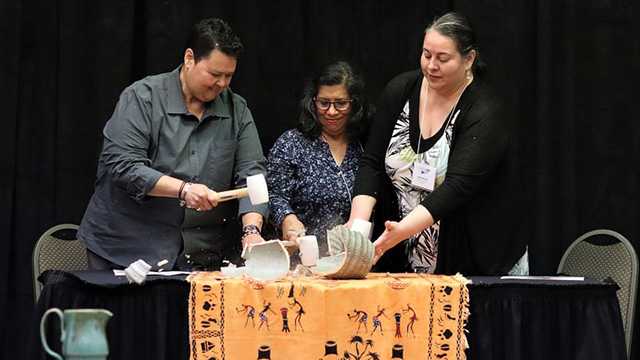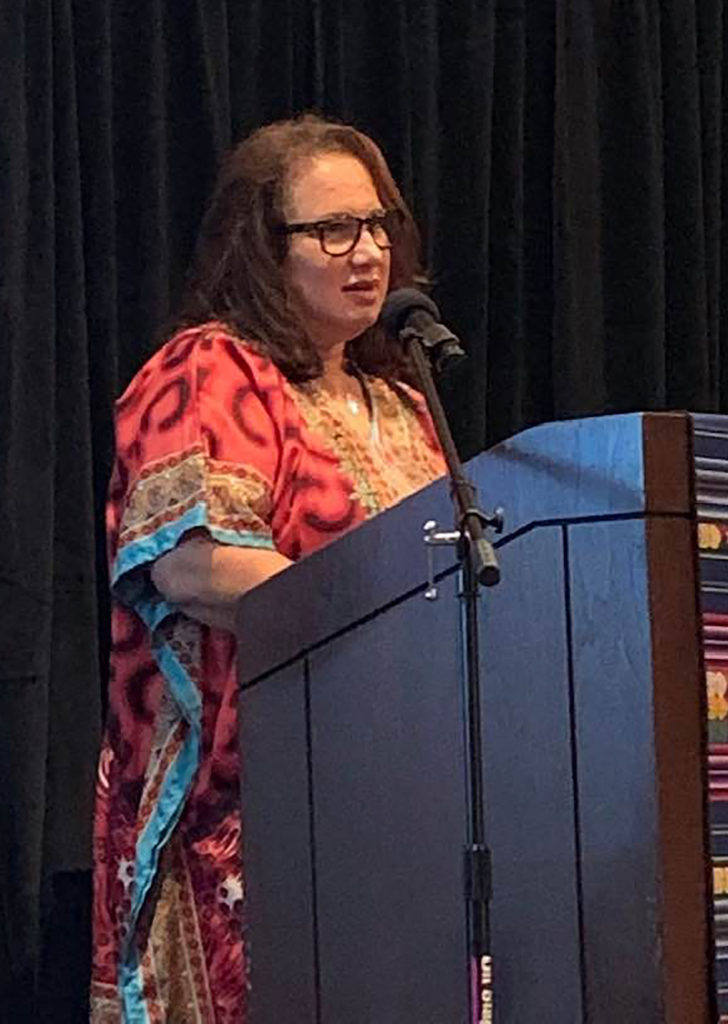 Members of MARCHA break a clay vessel as a symbol of the impact that decisions made by the 2019 General Conference have had on The United Methodist Church. From left are: the Revs. Vilma Cruz and Lucky Cotto and Pastor Imelda Roman. Photo by Michelle Maldonado, UMCOM.
Members of MARCHA break a clay vessel as a symbol of the impact that decisions made by the 2019 General Conference have had on The United Methodist Church. From left are: the Revs. Vilma Cruz and Lucky Cotto and Pastor Imelda Roman. Photo by Michelle Maldonado, UMCOM.
Racism, gun violence, the immigration crisis and internal clashes in The United Methodist Church were discussed at the 48th annual assembly of the Hispanic-Latino United Methodist caucus Aug. 1-4, in Philadelphia.
“We know that Hispanic-Latino ministries are going to be impacted by any of the decisions taken by the 2020 General Conference,” said Bishop Elias Galvan, Executive Director of Methodists Associated Representing the Cause of Hispanic-Latino Americans. “So, it is essential that the caucus take the voice of our people to General Conference.”
MARCHA, founded in 1971, is an unofficial UM organization that promotes concerns, contributions and cultural values of Hispanic-Latino people in the church and in society. “We condemn the current immigration laws for being inhuman, immoral, unfair, insensitive and racist, because they challenge the human dignity of the poorest and oppressed,” said the Rev. Joel Hortiales, MARCHA’s Director of Advocacy.
“What is happening in our country is deeply painful,” said the Rev. Dorlimar Lebrón of New York during a sermon. She recited the names of young immigrants who have died recently in the U.S. government’s custody.
During devotions one morning, mylar space blankets like those used in immigration detention centers were displayed and distributed to symbolize overcrowding and human rights violations of detained migrants, especially children. The 129 members present prayed for those subjected to abuse and injustice in their home countries and here.
The assembly also looked at the denomination’s divisive views about including or excluding LGBTQ persons from ordained ministry and marriage. They considered the probability of schism in 2020 and various plans of reorganization being presented.
In 2018 MARCHA officially supported the One Church Plan, which would have allowed churches and conferences to decide their own policies. That choice led some conservative members to withdraw from the caucus.
Presenters at this meeting analyzed biblical and theological perspectives on the church’s internal conflicts and its loss of membership.
“Enough talking about the church is dying…because of secularity, postmodernity or homosexuals,” said the Rev. Edilberto Lopez-Rodríguez, a seminary professor in Puerto Rico. “It is dying because we are not on mission, for lack of passion for Jesus Christ…(and) because we are not living or ministering in social holiness.”
The Rev. Luky Cotto of Eastern PA joined two other members in sharing their views and experiences after the 2019 Special General Conference. Together, they broke a clay vessel to symbolize the impact of decisions made on them, their ministries and relationships.
In a discussion of various options for the church’s future and possible effects on Hispanic-Latino ministries, 60 percent of attendees chose to “stay, resist and transform the church.” One-fourth preferred to dissolve and create a new denomination. And 10 percent wanted the U.S. to become a regional body like the non-U.S. central conferences.

MARCHA will ask General Conference 2020 to extend the National Plan for Hispanic-Latino Ministries into the next quadrennium and to increase the UMC’s missionary collaboration and development efforts in Latin America and the Caribbean.
The caucus honored the Rev. Lydia Muñoz (left) of Eastern PA, a 25-year member, with its Latino Excellence Award for “embodying MARCHA’s values and commitment” in her life and ministry.
This story was adapted from a UM News story, “MARCHA: Hispanic-Latino voice needed at GC2020,” by the Rev. Gustavo Vasquez. Content about the Rev. Lydia Muñoz was added.
